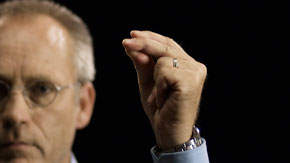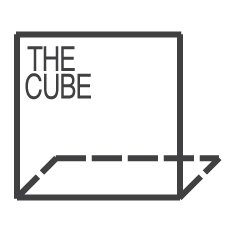
Superflex
The Financial Crisis
The Financial Crisis (Session I-V) is a new film work in which SUPERFLEX address the financial crisis and meltdown from a therapeutic perspective. A hypnotist guides us through our worst nightmares to reveal the crisis without as the psychosis within. During 4 sessions you will experience the fascination of speculation and power, fear, anxiety and frustration of loosing control, economic loss and personal disaster.
Session 1 – The Invisible Hand
Session 2 – George Soros
Session 3 – You
Session 4 – Old Friends
Interview with Jakob Fenger from Superflex
(Questions by Amy Cheng. Interview realized by Sylvie Lin. October 16, 2009, London. Chinese version included in Art and Society: Introducing Seven Contemporary Artists, published by the Taipei Fine Arts Museum, 2009. http://praxis.tw/publish/)
Q : First I’d like to start with your latest film. Filmmaking isn’t a main part of your practice until very recently, with Flooded McDonald (2009) and your latest film The Financial Crisis(2009).
A : We always worked with films, but earlier on it was more in a documentary kind of way. We did this project called the Guaraná Power, probably four, five years ago ; for that we also did some films. They are advertisements, small fictional stories. Indeed, in the last couple of years, we have become more interested in making more films.
Q : Why this interest in this medium? Why use films ?
A : With the way that we’ve been working, we have never been stuck in a specific medium. It’s always changing, depending on what we are doing. Sometimes it’s soft drinks, sometimes it’s beer, sometimes it’s biogas. There’ll be different kinds of media that you use for talking about something specific. In this case with the film, it might be a little bit different because it looks more like traditional films. This may be what you’re talking about. Actually, for me it’s not a big change. You could say that the main change of this film is that it starts and ends. It’s not like the kind of long-term projects that go on and on, which we also do, like the case of the Guaraná Power, the Free Beer or the biogas. This kind of projects somehow keep moving on, whereas our latest film has the sort of a start and an end.
Q : Why the idea of treating the theme of the financial crisis with the hypnotism ?
A : Concerning the idea of The Financial Crisis, first of all, what we claim here is that it’s a psychological problem. Of course it becomes factual because people are losing jobs and money in different ways. But on a very large level, it’s a psychological crisis. Somehow we try to treat this in an old-fashioned way of therapy where you go into different aspects of a disaster, look into the fear, see the fear, and learn to live with the fear.
The hypnosis part somehow deals also with the reason why we all start to think about the financial crisis and the hypnotic events. Because it’s also something that is created through media ; people start to think about it before they can actually feel it. And they can feel it because they talk about it. Then it’s a kind of hysteria. So there is also a very hypnotic part within the society.
Q : A very emotional effect.
A: Yes. The way that the media operates the issue. It’s true that the media keeps talking about the crisis, and people start to feel the crisis more and more, so it has a hypnotic effect. It’s the same with all kinds of fear, like the fear of terrorists, etc. You started to talk about something and it becomes reality after. It’s like a kind of hypnotic stage. So this is like a kind of treatment to a disease. Besides, our ways to react to things today are very hypnotic. Everybody’s been hypnotized to believe in the capitalism, in the fear of terrorists, this kind of things.
Q : In your artistic concept, we often see a tendency to foreground the principles hidden behind all kinds of capitalist economic activities, or the ways they operate. You use all kinds of forms and tools to transform, express and translate these usually invisible aspects into diverse processes or actions. What do you think to be the most difficult part in carrying out these projects ? Do you expect certain result out of such process, or just keep it open ?A : It’s the same with the question of the medium : we never know what medium we’ll work with next. It’s not a given thing. It depends on where we go. But we go somewhere without knowing where it’s going to end or where we’re going. If we knew all the answers, there’s no reason for making questions. Maybe it’s easier to see in the larger projects like the Guaraná Power. We started out on a very basic level. We meet some farmers in brazil, they told us about the power game going on between a big beverage company and the farmers. The farmers feel misused by the company. Then we started to discuss the situation with them and out of this conversation came Guaraná Power. This was a beginning of a long still not ended journey where everything is being reinvented and re-contextualised. And we do not know the answer. Also, there is no answer in the film on the financial crisis. It’s four different hypnotic sessions which kind of put you in a situation where you see something terrible and disastrous. But we don’t know what would come out of that. Of course, at the same time it’s a criticism toward the way we organize ourselves as humans and take the system for granted. When I grew up there was a socialist world and a capitalist world – there was a opposition. At least there was a game and its two sides, but today it’s no longer the reality. So what is there to believe in when the system collapse?
Q : Can we say that this is one of the motivations of your practice : to make alternative, not to say overt opposition ?
A : Maybe even not making an alternative but more to criticize the system or make obstacles. Again if you look at the Guaraná Power project, it works with the capitalism while also offering different positions within that. It uses the mechanism of the system to do something different.
Q : To encourage certain reflection, consciousness ?
A : Again it’s more than that. It’s also about taking action and doing things. Like the farmers in Brazil, they knew the problem, their limitations, everything. But they didn’t really take it to the next level, like saying : fuck them, let’s do it, let’s make this soft drink and move on. In a project like that, we go for actions.
Q : In your practice, we also see a very strong activist character. Can we say that ?
A : Certainly in our practice there’s an activist aspect, in the sense that it actually moves out to other fields. It is pro-active, not just hanging on and waiting for things to happen in the future. It is also going into a direct situation and making an action. But again it is a very dangerous term because it is mixed with the traditional political games and I don’t think that is what we are doing. I guess one of the big differences lies in that the political activists seems to know the answers ; there is a specific political goal. We are searching. We don’t know what we want and even though it may looks like we have got answers, it’s still a question. So when defining something to have an “activist character” one has to be aware that we are not doing mainstream politics.


